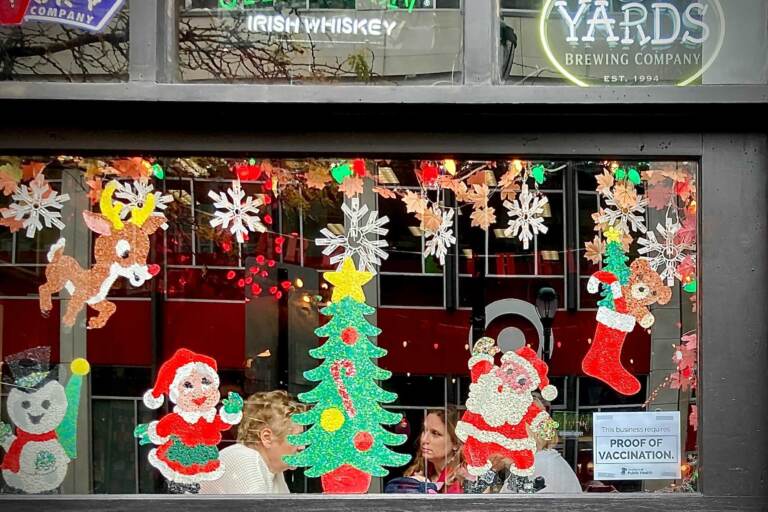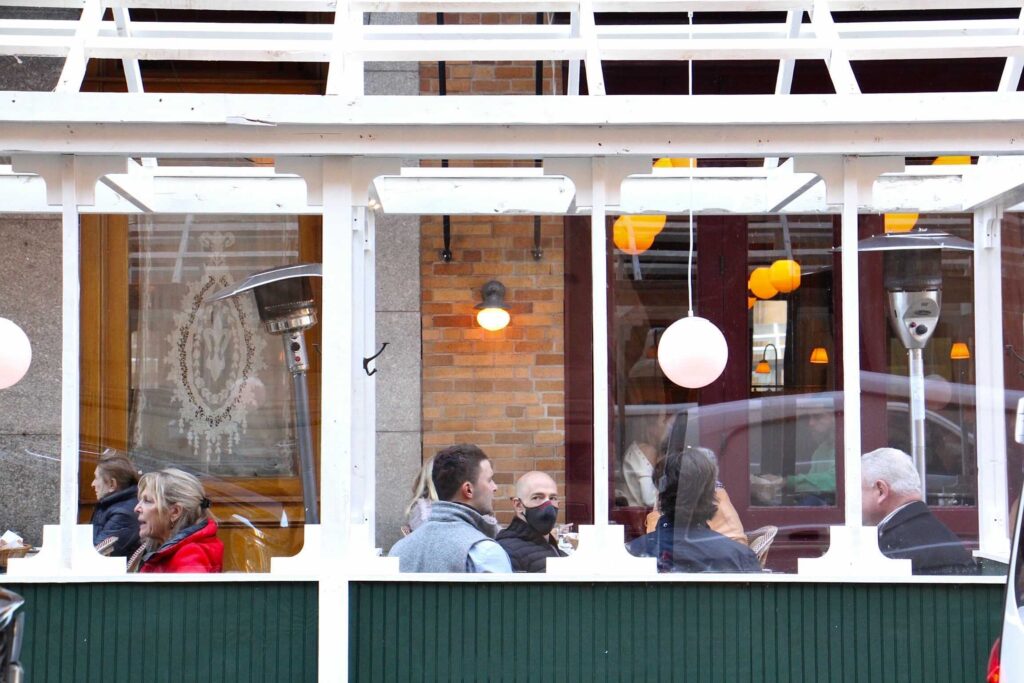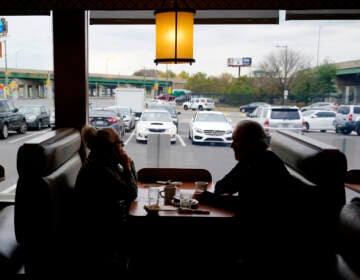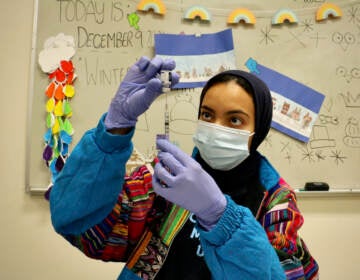That Philly vaccine mandate for indoor dining? Business owners mostly like it, but they have questions
The new rules take effect on Jan. 3. But business owners are wondering how to verify vaccine cards are legit and handle issues that arise.

Drinker’s Pub at 19th and Chestnut streets requires customers to show proof of vaccination. (Emma Lee/WHYY)
Ask us about COVID-19: What questions do you have about the coronavirus and vaccines?
One side effect of Philadelphia’s new COVID-19 regulations is confusion.
A few days after city officials announced an impending vaccine mandate for indoor dining, the Pennsylvania Restaurant and Lodging Association had compiled more than 50 questions about how they would work, according to Ben Fileccia, the group’s director of operations and strategy for Philadelphia.
The questions include:
- “How do you confirm the authenticity of vaccine cards?”
- “What response can we expect from the city when there are issues? Is it a 911?”
- “What about delivery drivers, people grabbing gift cards, plumbers, electricians?”
The regulations go into effect on Jan. 3, 2022. For the first two weeks, patrons will have the option of sharing recent negative tests instead of proof of vaccination. The new guidance applies not only to restaurants but to any establishment that provides food or drink, including stadiums, catering halls, and casinos.
Amid spiking cases and the arrival of the omicron variant, these restrictions received a mixed reaction from proprietors, even as public health experts say they are likely to nudge up the vaccination rate.
Though the mandate is new for some, around 30% of Philadelphia restaurants already require showing proof of vaccination to dine indoors, said Fileccia. Some who have taken that step said they are pleased that the city has made it official.
“The more the government pushes it, the better I like it,” said Jeffrey A. Miller, owner of Jeffrey A. Miller Catering.
Indoor venues he works with, such as the Racquet Club of Philadelphia, have already been requiring vaccination since the summer, Miller said. When the government makes policy, he said, it can actually be easier for business owners.
“Nobody wants to be the bad guy, but if the city is willing to make that call, then they’re sort of the bad guy. In which case, it sort of benefits everybody,” said Miller.
But Nancy Morozin, co-owner of The Dining Car in Northeast Philadelphia, said she’s worried about losing business.
“Our customers are already saying …. ‘Well, we’re just going to go to Bucks County,’” Morozin said. Guidelines that only affect some businesses, in some locations, feel unfair to her.
Being a business owner means trying to please customers who want everyone inside vaccinated, and also those who would rather leave than show proof of vaccination, said Morozin.
“We pretty much have to be Switzerland,” she said.
Any consequences?
This is the latest in a series of tightening restrictions through the fall, as COVID cases crept up, fueled by the delta variant. On Aug. 12, the city of Philadelphia began requiring businesses to enforce mask-wearing indoors, or to require proof of vaccination.
But the city doesn’t track how many businesses violate the rules.
“Unfortunately, we don’t have a way to provide a count because it would require reviewing each inspection report individually,” said spokesperson Sarah Peterson. “The city’s goal is not to punish or fine businesses but to protect Philadelphians and save lives.”
At the same time, the city encourages residents to report violations of its COVID-19 regulations. Since the previous restriction was announced on Aug. 11, Philly311 has received 685 complaints about businesses not complying with the mask-or-vaccine mandate. When a complaint is made, Peterson said, health inspectors are dispatched “to provide the establishment with education on the mandate.” Failure to comply may result in a citation, fine, or closure.
This type of enforcement seems to run on the honor system. Inspection reports show some businesses inspected since mid-August have been written up for failing to enforce the mask mandate, in some cases multiple times. When asked about one such case, Peterson said the inspection report indicated that the business came into compliance while the inspector was present, “which is our goal.”
“If a business refuses to correct the problem, the inspector has the ability to issue a cease operations order,” she said.

Will more people get vaccinated as a result?
In the months following the August policy change, coronavirus cases have mounted across Pennsylvania. In Philadelphia, new case counts have climbed to their highest point since the spring, according to city data. On Wednesday, 10 days before Christmas, city Health Commissioner Dr. Cheryl Bettigole urged people not to gather with distant family over the winter holidays, prompting an outcry.
Research shows that vaccine mandates, even those for optional activities such as dining out, can have a positive impact.
Jessica Fishman, director of the Message Effects Lab at the University of Pennsylvania, has studied the effect of a variety of mandates or incentives on whether people intended to get vaccinated. While a job requiring vaccination had the strongest effect, the research found that bars, restaurants, or airlines requiring vaccination had a small positive effect.
Rather than the mandates backfiring, said Fishman, “people are generally willing to comply. In addition, mandates often become the ‘new normal.’”
Morozin is seeing this firsthand at The Dining Car. Though most staff at the restaurant were vaccinated, she said, there were holdouts among longtime employees.
“They were afraid, they were just stinking afraid,” she said.
But the new guidance covers staff as well as customers, something Morozin said is forcing them to get off the fence.
“Now, they’re getting the Pfizer vaccine,” she said.

Saturdays just got more interesting.
WHYY is your source for fact-based, in-depth journalism and information. As a nonprofit organization, we rely on financial support from readers like you. Please give today.





![CoronavirusPandemic_1024x512[1]](https://whyy.org/wp-content/uploads/2020/03/CoronavirusPandemic_1024x5121-300x150.jpg)


